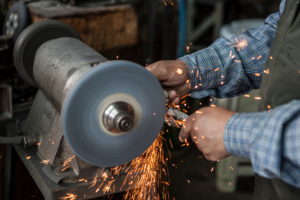Regular maintenance of locks is crucial to ensure they function properly and avoid common problems. The last thing anyone wants is to be locked out of their home or office due to a faulty lock. In this article, we will provide tips on how to prevent common lock issues through preventive maintenance.
One of the most common issues with locks is a key that gets stuck or won’t turn. This can be frustrating and time-consuming, especially if you’re in a hurry. The cause of this problem is often due to dirt and debris buildup inside the lock, which can prevent the key from turning smoothly. Regular cleaning and lubrication of the lock can help prevent this issue from occurring.
Understanding Lock Mechanisms
Types of Locks
There are several types of locks available in the market, each with its own unique mechanism. Some of the most common types of locks are:
- Deadbolts: These are the most popular type of lock used in homes and offices. They are sturdy and offer excellent security.
- Knob Locks: These locks are commonly used on interior doors. They are easy to install and operate.
- Lever Handle Locks: These locks are similar to knob locks but are easier to operate for people with disabilities.
- Cam Locks: These locks are commonly used in filing cabinets and mailboxes. They are easy to install and provide moderate security.
- Padlocks: These locks are portable and can be used on gates, sheds, and other outdoor equipment.
Common Lock Problems
Locks are prone to wear and tear, and over time, they may develop problems. Some of the most common lock problems are:
- Key Won’t Turn: This is a common problem with old locks. The key may get stuck or refuse to turn.
- Lock is Stuck: The lock may get stuck due to dirt, rust, or other debris.
- Broken Key: The key may break off inside the lock, making it impossible to open.
- Misaligned Lock: The lock may become misaligned due to wear and tear or improper installation.
To prevent these problems, it is essential to perform regular maintenance on your locks. This includes cleaning the lock mechanism, lubricating the moving parts, and tightening loose screws. By taking these simple steps, you can extend the life of your locks and avoid costly repairs.
Routine Maintenance Tips
Cleaning Techniques
Regular cleaning of locks is essential to ensure their smooth operation. Dirt, dust, and debris can accumulate inside the lock mechanism over time, causing it to become stiff and difficult to turn. To clean the lock, use a soft-bristled brush to remove any visible debris or dust from the exterior of the lock. Then, use a can of compressed air to blow out any remaining dirt or debris from the keyhole.
For more thorough cleaning, use a damp cloth to wipe down the exterior of the lock, being careful not to get water inside the keyhole. If the lock is particularly dirty or greasy, a mild detergent solution can be used to clean it. After cleaning, be sure to dry the lock thoroughly with a clean cloth.
Lubrication Procedures
Proper lubrication is essential to keep locks functioning smoothly. Over time, the lubricant inside the lock can dry out or become contaminated, causing the lock to become stiff or difficult to turn. To lubricate the lock, apply a small amount of graphite powder or silicone spray to the key and insert it into the keyhole. Turn the key several times to distribute the lubricant throughout the lock mechanism.
Be careful not to use too much lubricant, as this can cause the lock to become sticky and attract dirt and debris. It is also important to use the correct type of lubricant for your lock, as some types of lubricants can damage certain types of locks.
By following these routine maintenance tips, you can help prevent common problems with locks and ensure their smooth operation for years to come.
Preventive Measures
Environmental Considerations
One of the most important things to consider when trying to prevent common lock problems is the environment in which the lock is installed. Extreme temperatures, humidity, and exposure to the elements can all cause locks to malfunction. To prevent these issues, it is recommended to install locks in sheltered areas or to use weather-resistant locks.
Proper Usage Practices
Another important aspect of preventing lock problems is to use the lock properly. This includes avoiding excessive force when turning the key, lubricating the lock regularly, and avoiding the use of abrasive cleaning agents. It is also important to ensure that the lock is properly installed and maintained.
To summarize, preventing lock problems requires a combination of environmental considerations and proper usage practices. By taking these steps, you can help ensure that your locks function properly and avoid the need for costly repairs or replacements.
Troubleshooting Minor Issues
Stuck Keys
One of the most common issues with locks is stuck keys. This can happen due to various reasons, such as dirt, rust, or misalignment of the lock mechanism. If a key gets stuck in the lock, do not force it as it may cause further damage to the lock.
To troubleshoot this issue, try applying a lubricant to the lock mechanism. Graphite powder or silicone spray are both good options. Apply a small amount to the key and insert it into the lock. Turn the key gently to spread the lubricant. Repeat this process a few times until the key turns smoothly.
If the key is still stuck, try using pliers to gently pull it out. Be careful not to apply too much force as it may break the key. If none of these methods work, it may be necessary to call a professional locksmith.
Loose Components
Another common issue with locks is loose components. This can cause the lock to malfunction or become difficult to operate. Loose components can be caused by wear and tear or improper installation.
To troubleshoot this issue, check all the components of the lock, such as the screws, bolts, and latch. Tighten any loose components using a screwdriver or wrench. If any components are damaged, they may need to be replaced.
Regular maintenance can help prevent minor issues with locks. However, if these issues persist or become more severe, it may be necessary to call a professional locksmith to repair or replace the lock.
Professional Services
When to Call a Locksmith
There are times when a lock may be too damaged for a simple repair or maintenance. In such cases, it is best to call a professional locksmith. A locksmith can replace the lock and ensure that it is installed correctly, preventing any future issues.
Additionally, if you have lost your keys or suspect that they have been stolen, it is important to call a locksmith to rekey or replace the lock. This will prevent unauthorized access to your property.
Choosing a Reliable Service Provider
When choosing a locksmith, it is important to select a reliable and trustworthy service provider. Here are some tips to help you choose the right locksmith:
- Look for a licensed and insured locksmith. This will ensure that the locksmith has the necessary training and experience to handle your lock-related issues.
- Check reviews and ratings online. This will give you an idea of the quality of service provided by the locksmith.
- Ask for referrals from friends and family. They may have had a positive experience with a local locksmith.
- Get a written estimate before any work is done. This will help you avoid any surprises when it comes to the cost of the service.
By following these tips, you can ensure that you choose a reliable locksmith who can provide you with the necessary services to keep your locks in good working order.
https://www.angi.com/articles/6-keys-proper-door-lock-maintenance.htm

I’m Marcel Brandt, a locksmith with over 15 years of experience. I specialize in modern security solutions and love sharing tips to help fellow locksmiths succeed in their careers.




